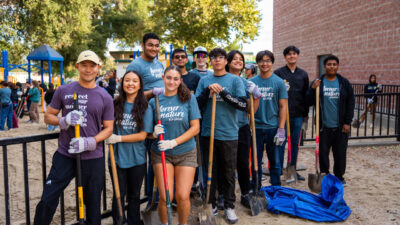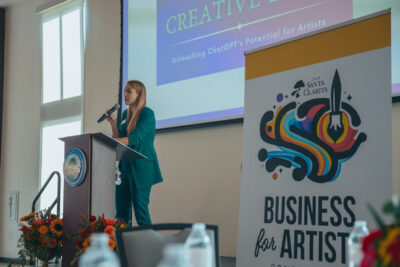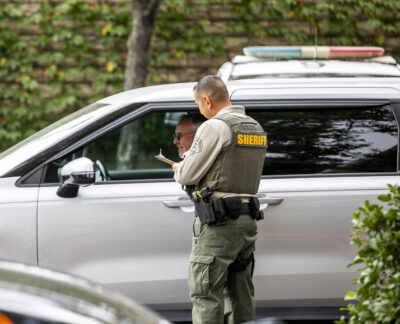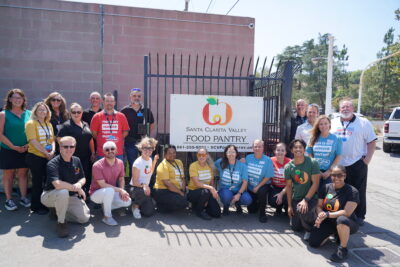In an era of deep political divides, finding moments of unity and shared understanding can seem nearly impossible. Yet one of the most ancient and meaningful Jewish holidays — Passover — offers an opportunity for people from all walks of life, regardless of political belief, to come together around the table.
Critical to finding common ground is the understanding that none of us possesses the entire truth. We search for it in others — by asking important questions, and recognizing that we are always learning. Each of us carries pieces of understanding, shaped by our lives, experiences and reflections. Our willingness to listen to the answers not only helps us grow, it also fosters unity and respect.
Passover is the holiday for asking questions — it’s literally built into the tradition. The most famous example is the Four Questions, traditionally asked by the youngest at the Seder, as we open the story of liberation from Egyptian slavery. We teach our children that knowledge and understanding begin with curiosity. And by starting with questions, we begin from a place of humility. During this season of liberty, it reminds us that asking questions is itself a form of freedom.
One of the most important questions is: How did slavery continue for generations? The Egyptians turned the Israelites against one another. When Moses and Aaron confront Pharaoh and demand Israel’s freedom, he only makes their labor harder and blames their new leaders. The people, in despair, turn on Moses, attacking him and saying:
“May the Lord look on you and judge you! You have made us obnoxious to Pharaoh and his officials and have put a sword in their hand to kill us.”
The Israelites’ loss of confidence in Moses’ leadership was manipulated by Egyptian rulers to prolong their oppression. Without unity and leadership, their bondage would persist.
Today, we face a parallel challenge. Our enemies are spending millions of dollars using our own media to turn us against each other. Foreign entities — including Russian and Iranian groups — have repeatedly been caught exploiting media platforms to provoke political tensions in the U.S. Our internal divisions serve their agendas. The entire political spectrum must come together now to bring this to an end.
The damage done to our society is profound. Families have been torn apart by today’s toxicity. While intergenerational differences have always existed, new media systems have amplified distrust. Algorithms now deliver personalized information, creating vastly different realities that isolate us from one another.
The Seder, the ritual meal at the heart of Passover, provides a sacred opportunity to reconnect. Through our traditions and texts, we find shared meaning and unity. Our homes can become sanctuaries for dialogue, empathy and understanding. While this isn’t always easy, it is critically important. As our prophets teach, if we can’t find harmony within our own families, we won’t be able to find it in the world outside.
Each year, on the Sabbath before Passover, the Jewish people read from the prophet Malachi:
“And he will turn the hearts of fathers to their children and the hearts of children to their fathers, lest I come and strike the land with a decree of utter destruction.” – Malachi 4:6
This verse underscores the urgency of restoring familial relationships, highlighting that reconciliation is key to preventing societal collapse. The “he” in this passage refers to Elijah the prophet, whom God promised to send before the “great and dreadful day of the LORD.” Elijah’s mission is to spark a spiritual awakening — fostering repentance and harmony within families that will ripple throughout the world. Each year at the Seder, we open the door for Elijah, hoping this will be the year he finally comes. But are we ready?
Former First Lady Barbara Bush once said at a college commencement:
“As important as your obligation as a doctor, a lawyer, or a business leader will be, you are a human being first, and those human connections — with spouses, with children, with friends — are the most important investments you will ever make. At the end of your life, you will never regret not having passed one more test, winning one more verdict, or closing one more deal. You will regret time not spent with a husband, a child, a friend, or a parent. Our success as a society depends not on what happens in the White House but on what happens inside your house.”
This Passover, on behalf of our family, we wish your family a year filled with unity, health and love.
Rabbi Mark Blazer is the rabbi of Temple Beth Ami in Santa Clarita.













